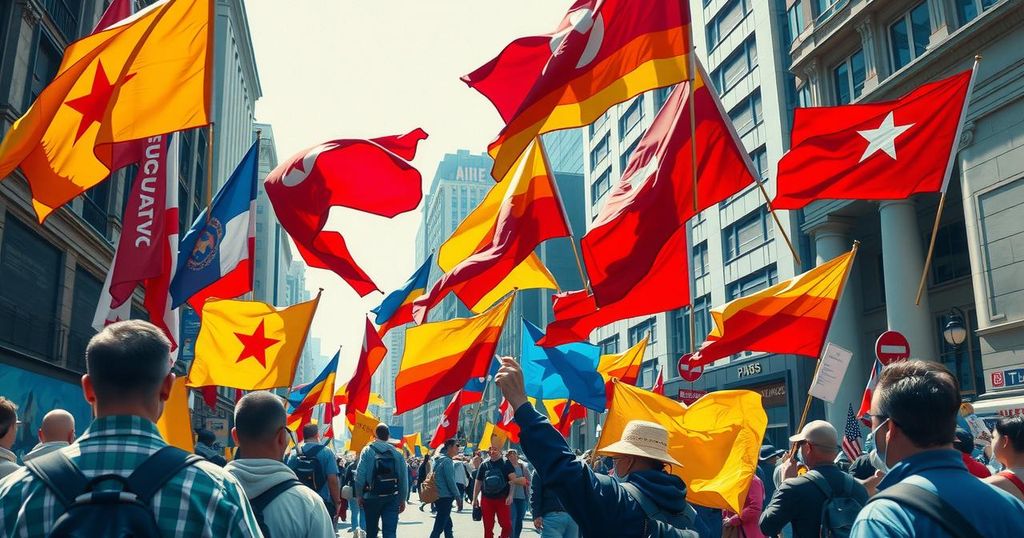Protests Erupt in Kenya Following Death of Activist Albert Ojwang in Police Custody
Protests have erupted in Kenya after activist Albert Ojwang died in police custody, raising questions about police transparency. Ojwang was arrested for social media criticism and alleged self-harm claims by police have sparked outcry from family and activists. As the one-year anniversary of earlier protests approaches, calls for justice and accountability grow louder amid ongoing frustrations with government negligence.
Protests have erupted across Kenya following the death of activist Albert Ojwang while in police custody. Ojwang was arrested last Saturday after allegedly tarnishing the police’s reputation on social media. His death comes as the nation approaches the one-year mark of ongoing demonstrations against government corruption and new tax reforms. Activists are voicing their outrage, demanding accountability over his suspicious death.
Ojwang’s demise occurred just hours after his detention. Police claim he injured himself by banging his head against the wall of his cell, although this explanation has been met with strong skepticism from his family and advocates. An autopsy was originally scheduled for Monday but has since been postponed and is now anticipated for Tuesday, leaving many unanswered questions lingering in the air.
Albert’s father has been waiting at the morgue, visibly distressed, as he contests the police’s version of events. Family lawyer Julius Juma expressed the family’s concerns over the circumstances of Ojwang’s death, questioning why he was placed in solitary confinement if the accusations against him were valid. He pointed out numerous visible injuries, asserting that Ojwang’s head was significantly swollen.
Human rights advocates gathered at the morgue to demand justice for Ojwang. Notably, Hussein Khalid, the head of Vocal Africa, emphasized the urgency of their calls, stating, “We say: ‘enough is enough’. We have lost too many lives at the hands of the police. Whatever the circumstances, no one should die in police custody.”
Protests surged in Nairobi on Monday, particularly near the Central Police Station where Ojwang met his fate. Tensions escalated when police used tear gas against the demonstrators. The police report claims Ojwang was found unconscious and taken to a hospital, where he was declared dead upon arrival. However, this narrative is under scrutiny as outrage continues to grow.
In response to the unrest, all officers involved have been suspended pending an investigation. Inspector-General of Police Douglas Kanja confirmed that the Independent Policing Oversight Authority has initiated a thorough examination of the incident. Nonetheless, numerous citizens remain doubtful of the investigation’s integrity. Khalid fears that only junior officers will be held accountable, insisting on justice for Ojwang and others who have faced similar fates.
Amnesty Kenya has issued a statement asserting that Ojwang’s arrest raises serious questions about police conduct, demanding that any officers found culpable must face consequences. This incident comes closely on the heels of last year’s violent clashes that resulted in deaths and disappearances of protesters.
Frustration is palpable among activists over ongoing issues like escalating unemployment and government negligence. Ndungi Githuku of the People’s Liberation Party articulated the community’s dissatisfaction, stating, “Our demands are still not met. The joblessness they had last year is tenfold. The killings are still happening.” He criticized the government’s failure to resolve concerns from prior protests, framing the current situation as one that favors the wealthy.
Social media protests have intensified following Ojwang’s death, rekindling demands for governmental accountability. Githuku remarked, “This government is actually urging us to come out in the street again. They are saying they will continue abducting and assassinating us.”
With just days to go until the anniversary of last year’s protests, many activists feel that the situation is ripe for renewed demonstrations, driven by a profound desire for justice and systemic change.
The death of activist Albert Ojwang while in police custody has sparked significant protests across Kenya, with citizens expressing outrage regarding police conduct and demanding accountability. Despite official claims about Ojwang’s death, doubts remain among his family and supporters. Activists continue to rally, fueled by wider sentiments of frustration over government policies, human rights violations, and a lack of resolution following previous protests. As the anniversary of recent uprisings approaches, tensions are likely to escalate further. Oregon inequities faced by the poor and marginalized remain at the forefront of ongoing protests calling for systemic change.
Original Source: www.rfi.fr




Post Comment